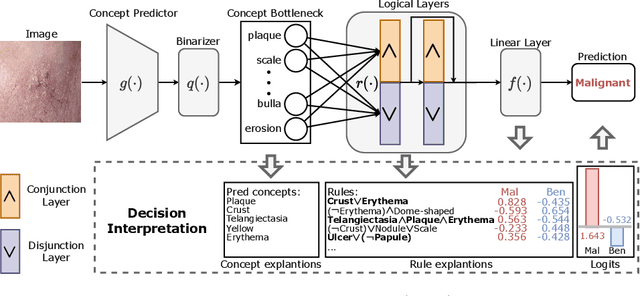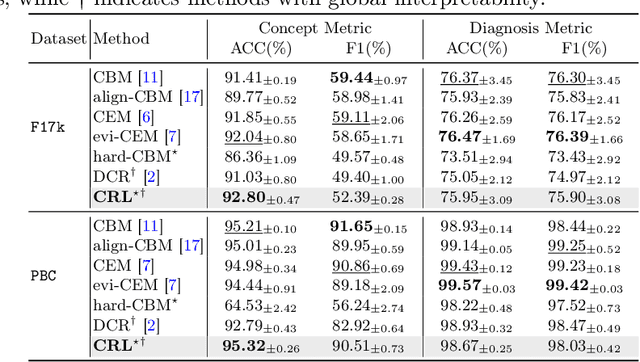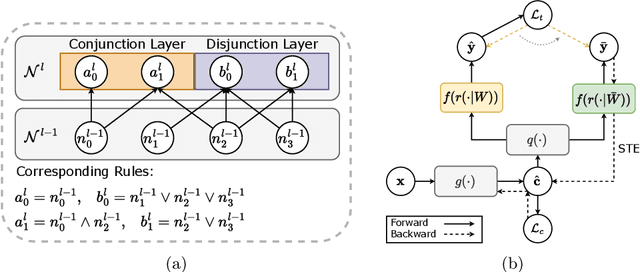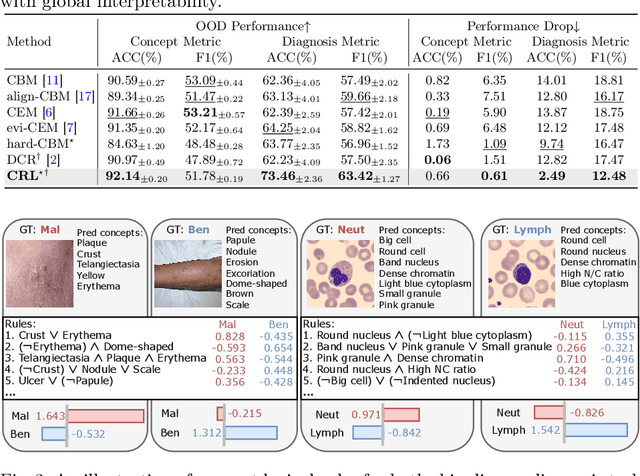Bomin Wang
Learning Concept-Driven Logical Rules for Interpretable and Generalizable Medical Image Classification
May 20, 2025



Abstract:The pursuit of decision safety in clinical applications highlights the potential of concept-based methods in medical imaging. While these models offer active interpretability, they often suffer from concept leakages, where unintended information within soft concept representations undermines both interpretability and generalizability. Moreover, most concept-based models focus solely on local explanations (instance-level), neglecting the global decision logic (dataset-level). To address these limitations, we propose Concept Rule Learner (CRL), a novel framework to learn Boolean logical rules from binarized visual concepts. CRL employs logical layers to capture concept correlations and extract clinically meaningful rules, thereby providing both local and global interpretability. Experiments on two medical image classification tasks show that CRL achieves competitive performance with existing methods while significantly improving generalizability to out-of-distribution data. The code of our work is available at https://github.com/obiyoag/crl.
Evidential Concept Embedding Models: Towards Reliable Concept Explanations for Skin Disease Diagnosis
Jun 27, 2024Abstract:Due to the high stakes in medical decision-making, there is a compelling demand for interpretable deep learning methods in medical image analysis. Concept Bottleneck Models (CBM) have emerged as an active interpretable framework incorporating human-interpretable concepts into decision-making. However, their concept predictions may lack reliability when applied to clinical diagnosis, impeding concept explanations' quality. To address this, we propose an evidential Concept Embedding Model (evi-CEM), which employs evidential learning to model the concept uncertainty. Additionally, we offer to leverage the concept uncertainty to rectify concept misalignments that arise when training CBMs using vision-language models without complete concept supervision. With the proposed methods, we can enhance concept explanations' reliability for both supervised and label-efficient settings. Furthermore, we introduce concept uncertainty for effective test-time intervention. Our evaluation demonstrates that evi-CEM achieves superior performance in terms of concept prediction, and the proposed concept rectification effectively mitigates concept misalignments for label-efficient training. Our code is available at https://github.com/obiyoag/evi-CEM.
Toward Universal Medical Image Registration via Sharpness-Aware Meta-Continual Learning
Jun 25, 2024Abstract:Current deep learning approaches in medical image registration usually face the challenges of distribution shift and data collection, hindering real-world deployment. In contrast, universal medical image registration aims to perform registration on a wide range of clinically relevant tasks simultaneously, thus having tremendous potential for clinical applications. In this paper, we present the first attempt to achieve the goal of universal 3D medical image registration in sequential learning scenarios by proposing a continual learning method. Specifically, we utilize meta-learning with experience replay to mitigating the problem of catastrophic forgetting. To promote the generalizability of meta-continual learning, we further propose sharpness-aware meta-continual learning (SAMCL). We validate the effectiveness of our method on four datasets in a continual learning setup, including brain MR, abdomen CT, lung CT, and abdomen MR-CT image pairs. Results have shown the potential of SAMCL in realizing universal image registration, which performs better than or on par with vanilla sequential or centralized multi-task training strategies.The source code will be available from https://github.com/xzluo97/Continual-Reg.
 Add to Chrome
Add to Chrome Add to Firefox
Add to Firefox Add to Edge
Add to Edge